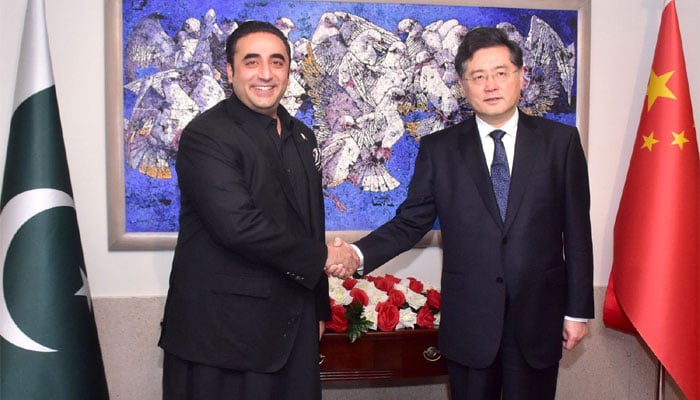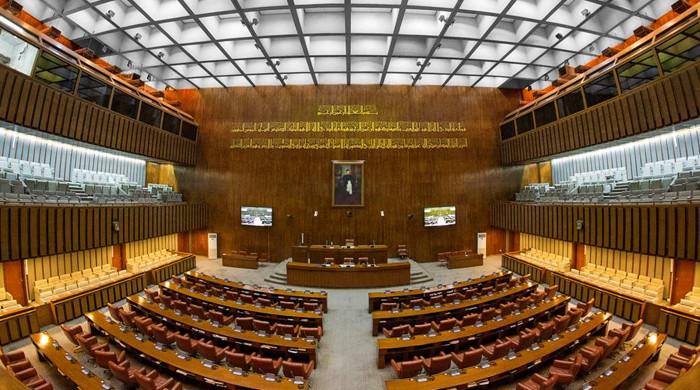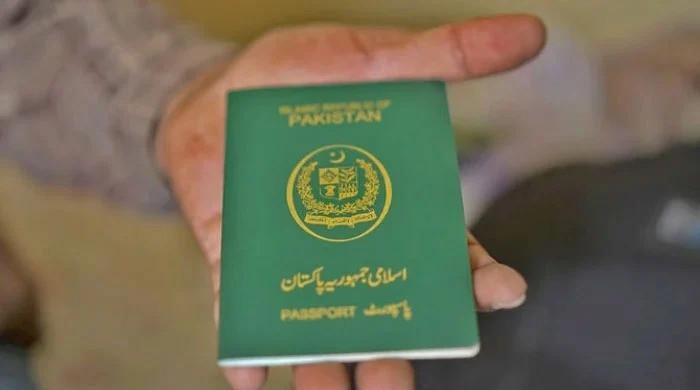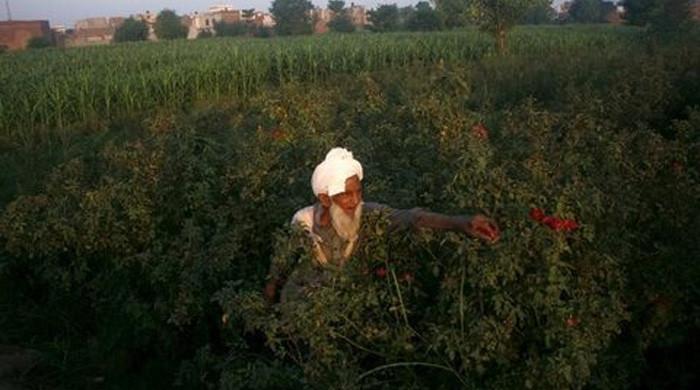In Pakistan visit, Chinese FM hopes Afghanistan to respect 'bordering nations' security concerns
Neighbours cannot be changed, Gang says as he urges Islamabad, Kabul to resolve matters through dialogue
May 06, 2023

- Chinese FM urges Taliban-led govt to pay heed to neighbours’ security concerns.
- Qin Gang expresses willingness to support Kabul, Islamabad against terrorism.
- Bilawal says Afghanistan’s peace remains vital to the prosperity of the region.
Chinese Foreign Minister Qin Gang, during his two-day official visit to Islamabad, has urged the Afghan Taliban-led government to pay heed to the security concerns of neighbouring countries, including Pakistan, and take steps to address them.
China's top diplomat made these remarks in a joint press stakeout alongside Foreign Minister Bilawal Bhutto Zardari in Islamabad on Saturday.
“We hope that [Afghan] Taliban will form an inclusive government and give rights to all ethnic groups,” he added.
He also called upon Pakistan and Afghanistan to resolve their bilateral issues through dialogue, saying that neighbours cannot be changed.
“China, Pakistan, and Afghanistan are friendly neighbouring countries. Neighbours cannot go anywhere,” he remarked.
The Chinese FM said Beijing was ready to expand security and counter-terrorism cooperation with Kabul and Islamabad to eliminate terror outfits from the region.
He said the Afghan people had been suffering for many years and urged the international community to take steps to alleviate the plight of the people of the war-torn country.
Addressing the presser, Foreign Minister Bilawal said that peace and stability in Afghanistan remain “vital” to the region.
“Peace and stability in Afghanistan remain vital to the socio-economic prosperity, connectivity, and development in the region. We will continue to work with all stakeholders for a peaceful, stable prosperous, and united Afghanistan.”
Pakistan's political crisis
Chinese Foreign Minister Gang also hoped Pakistan's political forces would come on the same page for the country's stability as the almost-year-long crisis persists.
"After reaching a consensus, I hope that the political forces can get a grip on the country's problems," Gang told the press conference.
The Chinese foreign minister noted that stability would help the rulers effectively address internal and external issues. He added that stability would also help the South Asian nation boost its economy.
Since his ouster in April last year, Pakistan Tehreek-e-Insaf (PTI) Chairman Imran Khan has been out on the streets intermittently and has also dissolved Punjab and Khyber Pakhtunkhwa's assemblies, which led to a fresh crisis in the country.
Pakistan Democratic Movement (PDM), which is in power in the centre, has also refused to adhere to Supreme Court orders for holding elections in Punjab within the time frame.
With the ongoing political turmoil, the economy also took a hit as the foreign exchange reserves fell to $4.46 billion — not even enough to cover a month's imports — and the rupee is hovering around historic lows.
Afghan situation
Earlier, during the 4th round of the Pakistan-China Foreign Ministers’ Strategic Dialogue in Islamabad, which was co-chaired by Gang and Bilawal, both sides also discussed the Afghan situation.
The entire range of bilateral relations and cooperation, including in political, strategic, economic, defence, security, education and cultural domains was reviewed during the dialogue, the FO said.
Regional and global issues of mutual interest were also discussed.
Stressing that peace and stability in Afghanistan is vital for socio-economic development, connectivity, and prosperity in the region, both sides called on all stakeholders to work together for a peaceful, stable, prosperous and united Afghanistan, which would firmly combat terrorism and live in harmony with its neighbours.
“The two sides underscored the need for the international community to provide continued assistance and support to Afghanistan including through unfreezing of Afghanistan’s overseas financial assets.
"The two sides agreed to continue their humanitarian and economic assistance for the Afghan people and enhance development cooperation in Afghanistan, including through extension of CPEC to Afghanistan,” the FO statement said.
It said both Pakistan and China reaffirmed their firm resolve to further strengthen their time-tested and all-weather strategic Cooperative partnership through continued close consultations at the leadership level, enhanced practical cooperation and robust implementation of the CPEC projects.
Pakistan, China vow to boost bilateral ties
The two foreign ministers underlined that Pakistan-China friendship was a historic reality and a conscious choice of the two nations.
Both sides agreed to continue their enduring support on issues concerning each other’s core national interests.
Reaffirming Pakistan’s special place in China’s neighbourhood diplomacy, the Chinese side reiterated its firm support for Pakistan’s sovereignty, independence and territorial integrity, as well as its unity, stability, and economic prosperity, read the FO communique.
The Pakistani side reiterated its commitment to the “One China” policy as well as its firm support to its neighbour on all core issues of its national interest, including Taiwan, Xinjiang, Tibet, Hong Kong and the South China Sea.
Welcoming the completion of a decade of the China-Pakistan Economic Corridor (CPEC) in 2023, the two sides hailed the multi-billion-dollar project as a shining example of Belt and Road cooperation which has accelerated socio-economic development, job creation and improvement of people’s livelihoods in Pakistan.
Reaffirming their commitment to the high-quality development of CPEC, both sides noted with satisfaction the steady progress of CPEC projects. The two sides reiterated the key significance of the ML-1 project under the CPEC framework and agreed to advance its earliest implementation.
They also agreed to actively advance the Karachi Circular Railway alongside key areas of cooperation including, inter alia, agriculture, science and technology, IT, and renewable energy.
The two sides reviewed the progress of various projects at Gwadar, including the Friendship Hospital and New Gwadar International Airport. Both sides reiterated their resolve to make Gwadar a high-quality port and a hub for regional trade and connectivity.
Acknowledging industrialisation as highly conducive to long-term sustainable economic growth and development, they also agreed to work together in the guidance of the Framework Agreement on Industrial Cooperation to actively advance industrial cooperation. Both sides reiterated that CPEC is an open and inclusive platform for win-win cooperation and invited third parties to maximise on benefits of the project.
The Pakistani side expressed gratitude to China for its economic and financial support and its generous assistance package for post-flood reconstruction and rehabilitation.
The two sides reiterated their firm resolve to counter-terrorism in all its forms and manifestations. Acknowledging the endeavours and sacrifices made by Pakistan in its fight against terrorism and extremism, the Chinese side appreciated the measures taken by Pakistan to ensure enhanced security of Chinese projects, personnel and institutions in Pakistan.
It also appreciated the steps taken to apprehend and bring to justice the perpetrators targeting Chinese nationals in Dasu, Karachi and other attacks.
Reviewing their cooperation on regional and international issues at multilateral forums such as the United Nations and Shanghai Cooperation Organisation (SCO), the FO said the two sides agreed to further deepen their coordination and cooperation to safeguard mutual interests. Both sides reaffirmed their commitment to the purposes and principles of the UN Charter, and support for multilateralism, free trade and win-win cooperation.
Discussion on Kashmir
Both sides underscored the importance of maintaining peace and stability in South Asia and the need for resolution of all outstanding disputes. The Pakistani side briefed the Chinese side on the latest developments of the situation in Jammu & Kashmir.
The Chinese side reiterated that the Kashmir dispute was left over from history between India and Pakistan and should be properly and peacefully resolved in accordance with the UN Charter, relevant UN Security Council resolutions and bilateral agreements.
“Both sides opposed any unilateral actions that further complicate the already volatile situation.”











